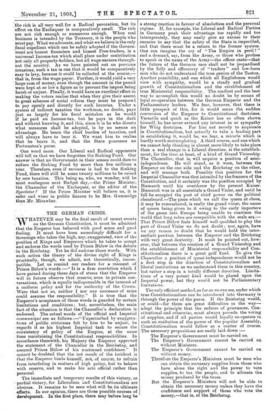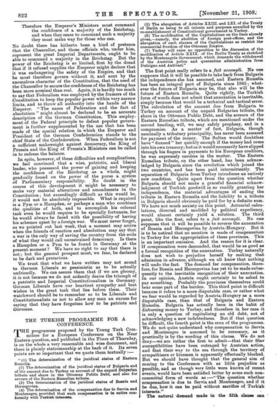, THE GERMAN CRISIS.
WHATEVER may be the final result of recent events V V on the German Constitution, it must be admitted 'that the Emperor has behaved with good sense and good feeling. It must have been exceedingly difficult for a • Sovereign who takes the high, nay, exaggerated, view of the position of Kings and Emperors which he takes to accept and endorse the words used by Prince Billow in the debate in the Reichstag. Yet he did endorse those words. With such action the theory of the divine right of Kings is • practically, though, we admit, not theoretically, incom- - patible. Let us remind our readers for a moment of • Prince Biilow's words :—" It is a firm conviction which I have gained during these days of stress that the Emperor will in future observe that reserve, even in private con- , versations, which is equally indispensable in the interest of a uniform policy and for the authority of the Crown. Were that not so, neither I nor any successor of mine could assume the responsibility." It is true that the Emperor's acceptance of those words is guarded by certain limitations and conditions; but, nevertheless, the main fact of the situation is that the Chancellor's declaration is endorsed. The actual words of the official and Imperial communiqué are 'as follows :—" Unperturbed by exaggera- tions of public criticisms felt by him to be unjust, he regards it as his highest Imperial task to secure the consistency of policy of the Empire, at the same _ time maintaining the Constitutional responsibilities. In • accordance therewith, his Majesty the Emperor approved the statement of the Chancellor in the Reichstag, and . assured Prince Billow of his continued confidence." It cannot be doubted that the net result of the incident is that the Emperor binds himself, not, of course, to refrain . from interfering in matters of high policy, but to behave . with reserve, and to make his acts official rather than personal.
The immediate and temporary results of this victory, or 'partial victory, for Liberalism and Constitutionalism are obvious. It remains to be seen what will be its ultimate effects. In our opinion, there are three possible courses of development. In the first place, there may before long be a strong reaction in favour of absolutism and the personal regime. If, for example, the Liberal and Radical Parties in Germany push their advantage too rapidly and too intemperately, they may easily give an excuse to their enemies to say that the safety of the State is imperilled, and that there must be a return to the former system. One can imagine the cry of "The Empire in peril ! " and a demand, say, from the Army, or those who profess to speak in the name of the Army—the officer caste—that the future of the German race shall not be jeopardised by the folly and effrontery of " traders " and low-born men who do not understand the true genius of the Teuton. Another possibility, and one which all Englishmen would view with sympathy, would be a steady and gradual growth of Constitutionalism and the establishment of true Ministerial responsibility. The readiest and the best way to accomplish this would no doubt be by means of loyal co-operation between the German Emperor and the Parliamentary leaders. We fear, however, that there is little prospect of this, for it would mean the sudden conversion of the Emperor to Constitutional doctrines. Versatile and quick as the Kaiser has so often shown himself, he has never evinced any interest in or sympathy for Whig doctrines. For him not merely to acquiesce in Constitutionalism, but actually to take a leading part in establishing it, would be, we fear, a miracle which is hardly worth contemplating. A third course, and one which we cannot help thinking is almost more likely to take place than a real change in a Liberal directiou, is the establish- ment, for the time at least, of a kind of Grand Viziership. The Chancellor, that is, will acquire a position of semi. independence. He will stand, as it were, between the Emperor on the one side and the Reichstag on the other, and will manage both. Possibly this position for the Imperial Chancellor was that intended by the framers of the Constitution, and it certainly was the position occupied by Bismarck until his overthrow by the present Kaiser. Bismarck was in all essentials a Grand Vizier, and until he fell he occupied the post of chief power on the political chessboard.—The piece which we call the queen at chess, it may be remembered, is really the grand vizier, the name of queen being given to it owing to the early importers of the game into Europe being unable to convince the world that long robes are compatible with the male sex.— That Prince Billow feels himself well qualified to play the part of Grand Vizier we do not doubt ; nor, again, have we any reason to doubt that he would hold the inter- mediate position between the Emperor and the Reichstag with very great dexterity. It must be pointed out, how- ever, that between the creation of a Grand Viziership and the establishment of Ministerial responsibility and Con- stitutionalism there is a great gulf fixed. To give the Chancellor a position of quasi-independence would not be a first step in the direction of Constitutionalism and liberal institutions as we understand them in this country, but rather a step in a totally different direction. Limita- tions of a very potent kind would be placed upon the Imperial power, but they would not be Parliamentary The only efficient method, as far as we can see, under which true Constitutionalism can be introdnced into Germany is through the power of the purse. If the Reichstag would, or could—for there are great difficulties in the way— adopt the principle that the redress of grievances, Con- stitutional and otherwise, must always precede the voting of supplies, and if all parties would loyally co-operate in such an exaltation of the power of the popular Assembly, Constitutionalism would follow as a matter of course. The necessary propositions are easily laid down :- The Emperor's Government must be carried on.
The Emperor's Government cannot be carried on without Ministers.
The Emperor's Government cannot be carried on without money.
Therefore the Emperor's Ministers must be men who can obtain the necessary supplies from those who have alone the right and the power to vote supplies, to tax the people, and to allocate the money produced by the taxes.
But the Emperor's Ministers will not be able to obtain the necessary money unless they have the . confidence and support of those who vote the money,—that is, of the Reichstag. Therefore the Emperor's Ministers must command the confidence of a majority of the Reichstag, and when they cease to command such a majority they must make way for those who can.
No doubt there has hitherto been a kind of pretence that the Chancellor, and those officials who, under him, represent the great Imperial Departments, ought to be able to command a majority in the Reichstag. But the power of the Reichstag is so limited, first by the dread that if it refused supplies the Emperor might declare that it was endangering the safety of the Empire, and that he must therefore govern without it, and next by the anomalous character of the Constitution, that the need of the Chancellor to secure the confidence of the Reichstag has been more nominal than real. Again, it is hardly too much to say that Federalism was employed by the framers of the Constitution to keep the popular power within very narrow limits, and to throw all authority into the hands of the Emperor. "The name of Federation and the fact of absolutism" might almost be declared to be an accurate description of the German Constitution. This employ- ment of the Federal principle to defeat popular govern- ment is further supplemented by the use that has been made of the special relation in which the Emperor and President of the German Confederation stands to the chief State of the Confederation. When Federalism is not a, sufficient makeweight against democracy, the King of Prussia and the King of Prussia's Ministers can be called in to redress the balance.
Iu spite, however, of these difficulties and complications, we feel convinced that a wise, patriotic, and liberal leader, who possessed the power of gaining and keeping the confidence of the Reichstag as a whole, might gradually found on the power of the purse a system of Parliamentary responsibility. No doubt in the course of this development it might be necessary to make very material alterations and amendments in the Constitution ; but exceedingly difficult as this would be, it would not be absolutely impossible. What is required is a Pym or a Hampden, or perhaps a man who combines the qualities of both, and to accomplish his colossal task even he would require to be specially fortunate, for be would always be faced with the possibility of having his schemes upset by a foreign war. We must never forget, as we pointed out last week, that a moment may arrive when the friends of reaction and absolutism may say that a war is the only way of saving the country from the evils of what they would call unrestrained democracy. Is there a Hampden or a Pym to be found in Germany at the present moment ? We have no right to say that there is not ; but the general prospect must, we fear, be declared to be dark and precarious.
We trust that what we have written may not sound to German Liberals so pessimistic as to be actually unfriendly. We can assure them that if we are gloomy, it is not because we do not ardently desire the triumph of a patriotic and Imperial Constitutionalism in Germany. German Liberals have our heartiest sympathy and best wishes in the great task that lies before them. Their watchword should be to remember so to be Liberals and Constitutionalists as not to allow any man an excuse for saying that they have forgotten how to be patriots and erermans.

































































 Previous page
Previous page